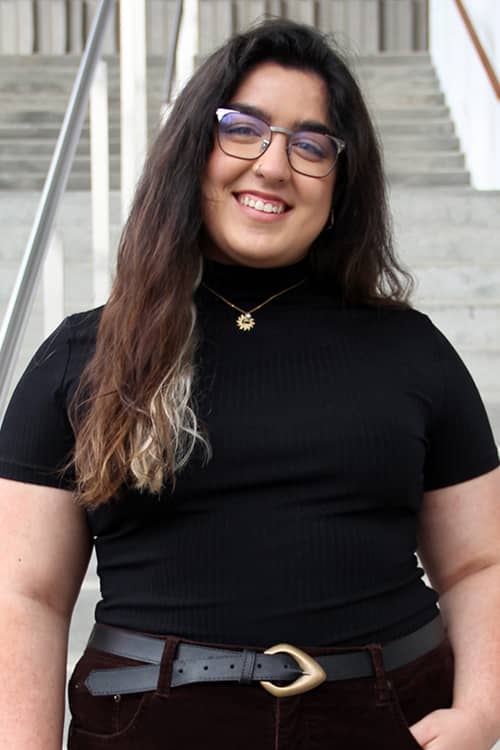
Bianca Robles-Muñoz, Undergraduate student, Speech and Hearing Sciences
Examines bilingualism and equity
• Hometown: League City, TX
• Faculty mentor/advisor: Dr. Kristi Hendrickson CCC-SLP, Assistant Professor in the Department of Communication Sciences and Disorders, Lab Director of the Psycholinguistics Lab
• What is your degree program and expected graduate date? Speech and Hearing Sciences B.A., minors in Latino/a/x Studies and American Sign Language, Graduating May 2021
• Please describe your research: My area of research as an undergraduate student has focused on studying the ways hard of hearing and bilingual populations process and organize language in the brain. In addition to research in the lab, I also do community outreach and engagement work focused on addressing the need for culturally responsive care in health professions and research for historically underserved and marginalized populations. I founded the TOGETHER (Targeting Our Goals for Equitable Treatment in Healthcare, Education and Research) Series, a virtual platform for diverse interdisciplinary speakers to present on topics relevant to addressing inequities in health and compiled into a free online resource for students, professionals and community members. You can find more information about the TOGETHER Series here: https://deltacenter.uiowa.edu/together
• In simple terms, why does this research matter? Within the field of speech and hearing sciences, there is a lack of research literature considering culturally diverse populations, a pattern consistent with the lack of diversity within the profession. This research matters not only to better understand those who walk into the clinic from diverse backgrounds, but also to better prepare and educate the professionals who interact with and care for them. The virtual design of my community engagement project is in effort to offset financial barriers typically associated with accessing research findings and attending conferences which gatekeep those who can access continued education.
• How soon after starting at the University of Iowa were you able to participate in research? I got involved with research in the spring semester of my second year as a research assistant in the Psycholinguistics Lab and had no prior experience or even understanding of what being involved with research really meant. The upperclassmen and my faculty mentor, Dr. Kristi Hendrickson, taught me everything I needed to know and I fell in love with research. I’ve been involved with research within my own lab and collaborating with others ever since.
• How has being involved in research made you more successful at the University of Iowa? Being involved with research has given me so many opportunities to directly apply what I am learning in my classes to what I’m doing in the lab and gain a deeper understanding by putting those lessons into practice. It also has given me the opportunity to meet other students and faculty who have become an amazing support system for navigating higher education and pursuing a graduate education. Combining what I’m learning in my Latino/a/x Studies and American Sign Language classes with the research I do, I’ve learned the value of integrating the lessons from cultural studies with my science coursework.
• What are your career goals and/or plans after graduation? After graduation I will be pursuing a M.A. in Speech-Language Pathology. I hope to become a Speech-Language Pathologist and I have special interests in working with underserved populations such as bilingual populations, the Deaf community, as the LGBTQ+ community doing gender-affirming voice therapy. I might pursue a Ph.D. someday, but first we’ll see where practicing as a clinician takes me.
• Does your research have connections to or implications for COVID-19? Please explain. Those most greatly affected my COVID-19 have been black, brown and low-income communities, and my work to educate healthcare professionals on supporting these communities can help inform their clinical practices with these populations.
Banner location: online—
